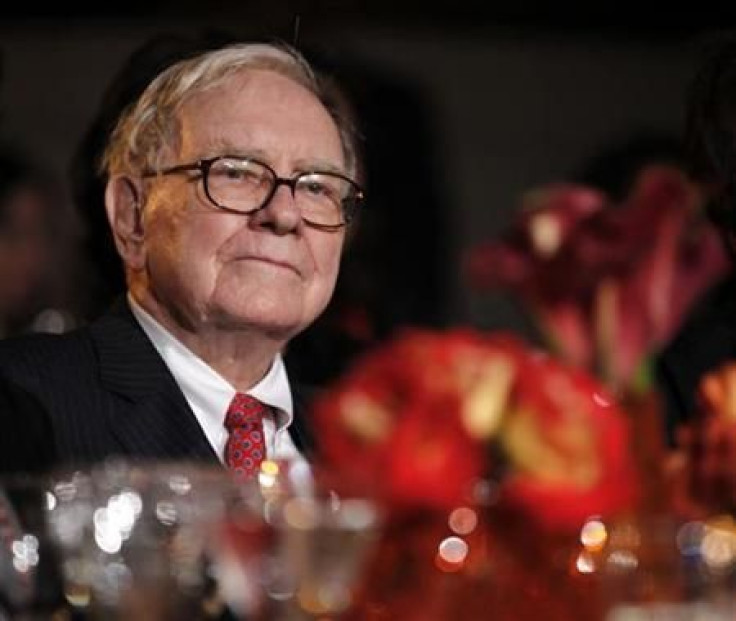Warren Buffett says he can't gauge Apple's profitability in next 10 years

Warren Buffett, Berkshire Hathaway Chairman, confirmed his reluctance to invest in technology stocks, called South Korea a good hunting ground for acquisitions and said he sees buying opportunity in Japan.
Nuggets of investment wisdom were dropped by the Oracle of Omaha in Daegu, South Korea.
Speaking about South Korea offering good prospects for acquisition, he said: Large companies appeal to me and Korea has a number of large companies obviously, so it's a hunting ground.
Buffett also told Reuters that Japan offers a buying opportunity. He said : it will take some time to rebuild, but it will not change the economic future of Japan.
Regarding electronics makers, Warren Buffett told Bloomberg: We held very few in the past and we're likely to hold very few in the future.
Citing the oft-repeated Coco-Cola example he said: it's very easy for me to come to a conclusion as to what it will look like economically in five or 10 years, and it's not easy for me to come to a conclusion about Apple.
While Apple stocks have been soaring, Berkshire Hathaway has shied away from investing in them. Buffett told Bloomberg: Even though Apple may have the most wonderful future in the world, I'm not capable of bringing any drink to that particular party and evaluating that future.
The recent quotes by Buffett just confirmed his long-standing aversion to technology stocks.
Buffett plays bridge with former Microsoft CEO Bill Gates but never invests in technology companies. Buffett holds on the axiom of investing in businesses one understands. In his 1998 annual shareholder meeting Buffett said: I don't want to play in a game where the other guy has an advantage. I could spend all my time thinking about technology for the next year and still not be the 100th, 1,000th or even the 10,000th smartest guy in the country in analyzing those businesses. In effect, that's a 7- or 8-foot bar that I can't clear. There are people who can, but I can't.
Further buttressing his axiom of understanding the business one invests in, he said: Therefore, it's better for us to swing at pitches. Different people understand different businesses. The important thing is to know which ones you do understand and when you're operating within your circle of competence.
Another reason that Buffett cited for his technology-wary ways is that technology stocks are prone to change. Fool.com reported the following comment he delivered in the 1999 annual meeting: We think [new technology] is very beneficial from a societal standpoint. Our own emphasis is on trying to find businesses that are predictable in a general way as to where they'll be in 10 or 15 or 20 years. That means we look for businesses that in general aren't going to be susceptible to very much change. We view change as more of a threat investment-wise than an opportunity.
When we look at a business and see lots of change coming, 9 times out of 10, we're going to pass -- whereas when we see something that is very likely to look the same 10-20 years from now, we feel much more confident about predicting it.
Buffett has also been reluctant on hiring someone to invest in tech stocks. He said in the 1999 annual meeting: We will never turn our money over to somebody else. If we're going to lose your money as Berkshire shareholders, we're going to lose it ourselves -- and we're going to come back and look you in the eye and tell you how we lost it.
Speaking about the dot.com bubble, Buffett told Reuters in 2001: It was as if some virus, racing wildly among investment professionals as well as amateurs, induced hallucinations in which the values of stocks in certain sectors became decoupled from the values of the businesses that underlay them.
Near the peak of the technology boom in 1998, he told Associated Press: If I taught a class, on my final exam I would take an Internet company and ask (my students), 'How much is this company worth?' Anyone who would answer I would flunk.
In the 2009 annual report Buffett said: Charlie and I avoid businesses whose futures we can't evaluate, no matter how exciting their products may be.
Just because Charlie and I can clearly see dramatic growth ahead for an industry does not mean we can judge what its profit margins and returns on capital will be as a host of competitors battle for supremacy. At Berkshire we will stick with businesses whose profit picture for decades to come seems reasonably predictable.
The above quotes offer some insight into Buffett's rationale about rejecting technology stocks. Regarding what companies he likes to buy, here are some key principles detailed in Berkshire Hathaway's 2010 annual report:
-- Large purchases (at least $75 million of pre-tax earnings unless the business will fit into one of our existing units)
-- Demonstrated consistent earning power (future projections are of no interest to us, nor are turnaround situations)
-- Businesses earning good returns on equity while employing little or no debt
-- Management in place (we can't supply it)
-- Simple businesses (if there's lots of technology, we won't understand it)
-- An offering price (we don't want to waste our time or that of the seller by talking, even preliminarily, about a transaction when price is unknown)
© Copyright IBTimes 2024. All rights reserved.











